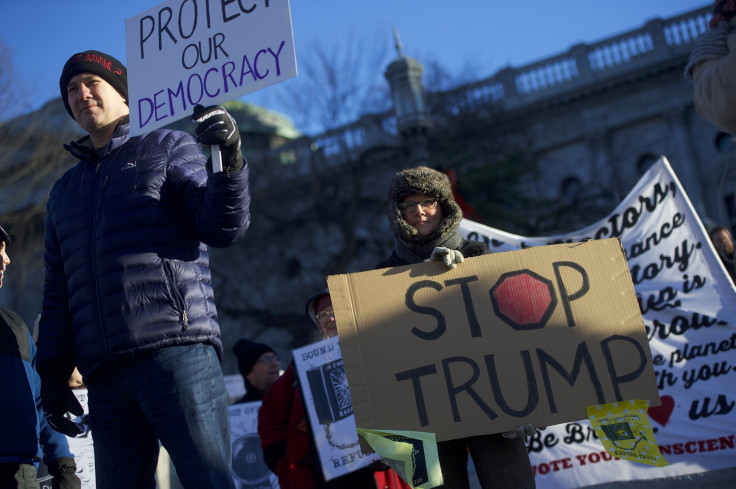Donald Trump Impeachment Odds: Will Trump Resign? President-Elect's Link To Russia Hacking vs. Richard Nixon's Watergate

With his inauguration just four days away, Donald Trump is already facing harsh predictions about the likelihood that he will remain in office.
British gambling company Ladbrokes gave Trump 8/1 odds that he will even be sworn in on Jan. 20 and had 50-50 odds that Trump wouldn't complete his four-year term due to impeachment or resignation. Last week, a Quinnipiac University poll listed Trump's favorable ratings at just 37 percent compared to a 51 unfavorable rating. No president-elect has entered the Oval Office with lower popularity.
The ratings come at a time when Trump has had to counter a Buzzfeed report that contained “explosive—but unverified—information.” The documents cite compromising content the Russians purportedly gathered about Trump and also detail his ties to Russia. Although the documents have not been substantiated, their salacious stories have been widely published.
On Wednesday, Trump conceded for the first time that Russian operatives hacked the Democratic National Committee during the election, though he disputed intelligence reports that Russia helped him win. In December, a senior intelligence official disclosed there was substantial evidence that the cyber attack was authorized by Russian President Vladimir Putin, whom Trump had previously spoken admiringly about.
The new joke in town is that Russia leaked the disastrous DNC e-mails, which should never have been written (stupid), because Putin likes me
— Donald J. Trump (@realDonaldTrump) July 25, 2016
In a July press conference in Florida, Trump openly invited Russia to hack Hillary Clinton's emails as secretary of state. “I will tell you this, Russia: If you’re listening, I hope you’re able to find the 30,000 emails that are missing,” Trump said. “I think you will probably be rewarded mightily by our press."
While Trump has said he has never met Putin, he has shared positive sentiments about him several years before running for president. Trump said Putin is "doing a great job in rebuilding the image of Russia and also rebuilding Russia period," in an interview with CNN's Larry King in December 2007.
As early as Friday, in an interview with the Wall Street Journal, Trump said he would be open to lifting sanctions on Russia but plans to keep them for "at least a period of time."
Such talk has prompted questions that Trump's relationship with Putin runs deeper than expected. There is no evidence that Trump or anyone on his campaign team conspired with the Kremlin to rig the election, but if such matters come to light, Trump would almost certainly face impeachment.
In September, Clinton's running mate, Sen. Tim Kaine of Virginia, referred to Trump while comparing the similarities with the DNC hacking to Richard Nixon's role in Watergate.
"A president was impeached and had to resign over an attack on the DNC during a presidential election in 1972," Kaine said on ABC’s “This Week."
"This is serious business. So contrast the Hillary situation, where the FBI said there’s no need for legal proceedings, with an attack that is being encouraged by Donald Trump on the DNC by Russia, similar to what led to the resignation of a president 30 years ago.”
The matter does indeed share some similarities with the burglary of the Watergate Hotel and Office Building in Washington, D.C., by the Nixon campaign in January 1972. Decades before email and the internet was ever introduced, the DNC's headquarters at the Watergate Complex was infiltrated by members of Nixon's camp to photograph documents and wiretap telephones. More details surfaced after his reelection, and Nixon was ultimately forced to resign over the Watergate scandal.
Like Nixon, Trump has been public about his disdain for the press while growing increasingly combative. Trump has called the media "dishonest" and "unbelievable liars," while recently branding CNN as "fake news." After losing the California gubernatorial election to Pat Brown in 1962, Nixon famously and bitterly told the press, "You won't have Nixon to kick around anymore."
When he won the presidency, Nixon was relatively popular, while Trump is going into Inauguration Day with low support for a president-elect. If his approval ratings continue to sink, he may have dwindling support from his GOP colleagues in the House and Senate. During the primaries, Trump feuded with fellow Republicans Sen. John McCain of Arizona, Sen. Ted Cruz of Texas and Sen. Marco Rubio of Florida.
Meanwhile, Trump's 37 percent favorability rating is particularly poor. In comparison, President Barack Obama had a 78 percent favorable rating in a Gallup poll conducted Jan. 9-11 in 2009. According to Pew Research published on Jan. 11, 2001, George W. Bush, who had endured a long battle against Al Gore over a contentious recount effort in Florida, still received a 50 percent favorable rating for "the job he has done in explaining his policies and plans for the future."
© Copyright IBTimes 2025. All rights reserved.






















